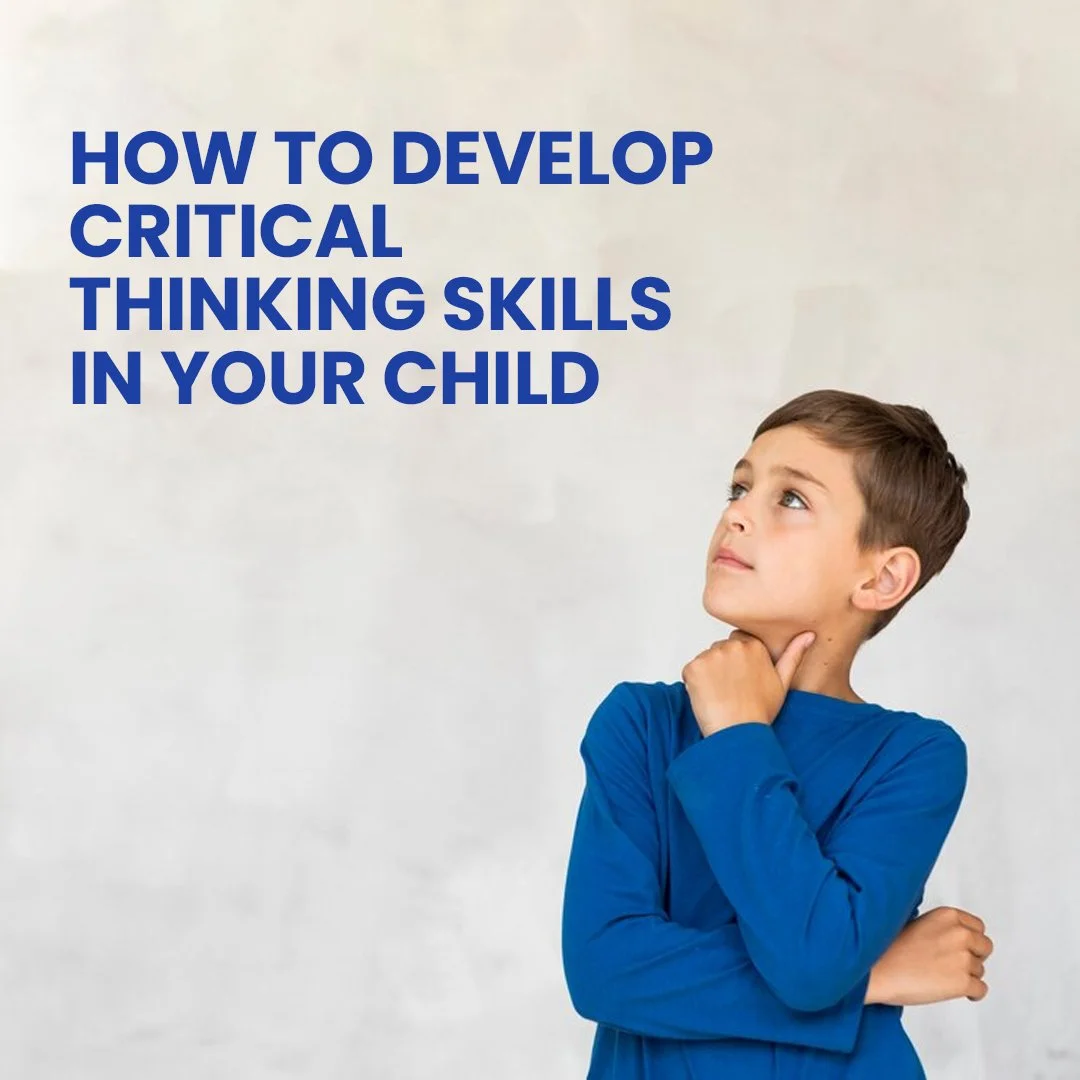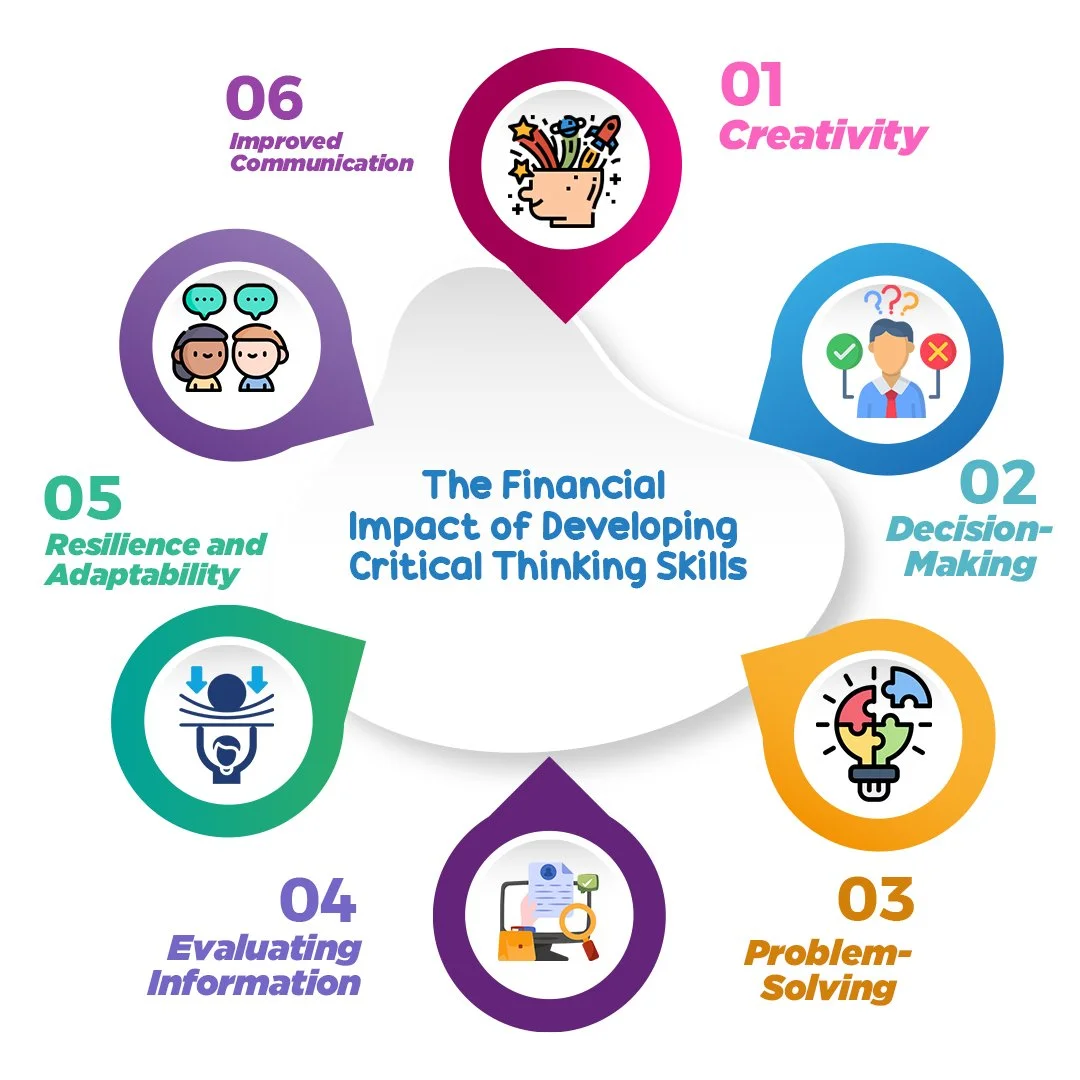How to Develop Critical Thinking Skills in Your Child
Think of your child's mind like a cocoon full of potential but waiting for the right moment to break free. Without the space to question, explore, and think independently, their critical thinking skills remain tucked away, undeveloped. As parents, it’s not enough for your child to memorise facts or follow instructions. You want them to ask 'why', wonder 'what if', and confidently make sense of the world around them.
In today’s fast-paced world, children need more than just knowledge. They must learn to analyse, compare, and solve problems, skills that will shape their future decisions, whether it’s choosing a career, managing finances, or building relationships. Critical thinking skills are like a mental toolkit, helping children break down complex information, weigh options, and form their judgments.
But here’s the catch: these skills don’t just happen on their own. They need to be nurtured, much like a butterfly needs the right conditions to emerge from its cocoon.
This blog is your guide to a practical, no-nonsense approach to understanding what critical thinking truly means, why it’s essential, and, most importantly, how you can foster these critical thinking skills in your child’s everyday life. Let’s break it down step by step so you can watch your child spread their wings and soar.
The Financial Impact of Developing Critical Thinking Skills
When we think about preparing our children for the future, we often focus on academic success or extracurricular achievements. But what about the skills that shape how they handle money, make decisions, and seize opportunities? Developing critical thinking skills isn’t just about solving puzzles or answering tricky questions. It’s about shaping their financial future. Let’s break down how these skills directly impact their ability to succeed in life.
Creativity
Creativity goes beyond drawing pictures or building Lego castles. It’s about thinking outside the box. Children who learn to approach problems creatively often grow into adults who find innovative solutions, start businesses, and explore entrepreneurial opportunities. Whether it’s launching a small online business or inventing a new product, critical thinkers have the potential to carve their financial paths. Without creativity, children may struggle to adapt to changing job markets or spot new opportunities, leaving them financially stuck.
Decision-Making
Every day, children make decisions choosing between saving their pocket money for a toy or spending it on sweets. These seemingly small choices lay the groundwork for future financial decisions. Strong decision-making skills help children weigh the pros and cons of their actions, reducing the risk of impulsive mistakes. For example, when a child plans how to spend their birthday money, they learn the importance of thoughtful financial choices.
Problem-Solving
When a child figures out how to fix a broken toy or complete a tricky jigsaw puzzle, they’re developing problem-solving skills. These moments train their minds to tackle challenges methodically, a crucial ability for future careers. Problem-solvers grow into resourceful adults who can handle work-related issues efficiently, a trait employers value highly. Early exposure to these critical moments sharpens their ability to secure better job opportunities later in life.
Evaluating Information
In a world full of information, children need to learn how to separate fact from fiction. Imagine a child comparing two piggy banks, one that’s locked and secure versus one with a loose lid. Through guided questioning, parents can teach their children how to evaluate which option keeps their savings safer.
Resilience and Adaptability
Children face setbacks losing a board game, failing to build a block tower, or missing out on a school reward. Teaching them to bounce back and adapt not only builds emotional strength but also financial resilience. These experiences help them understand that losses are part of life, preparing them to handle future financial setbacks, like saving again after spending their allowance too quickly. Resilience today means financial stability tomorrow.
Improved Communication
Good communication starts early, like when a child negotiates for extra playtime or a higher allowance. Parents can use these moments to teach their children how to express their needs clearly and respectfully. Strong communication skills enable kids to confidently discuss their value, whether it’s persuading parents to raise their pocket money or, in the future, negotiating salaries. Effective communicators are often more successful in securing better financial deals.
Developing critical thinking skills isn't just about helping children pass exams — it’s about securing their financial future. Each skill, from creativity to communication, shapes how they’ll handle money, face challenges, and grab opportunities. But how can parents foster these skills in their children’s daily lives? Let’s dive into practical, everyday steps you can take to build a strong foundation for your child’s critical thinking journey.
Steps Parents Can Take to Develop Critical Thinking Skills in Children
Raising a child who thinks critically doesn’t happen in one day. It’s a journey that requires patience, consistency, and the right strategies. The good news? Parents play a crucial role in shaping these skills, and simple, everyday actions can make a big difference. Let’s explore practical steps you can take to nurture your child’s critical thinking skills.
1. Provide Opportunities
Play isn’t just fun. It’s a gateway to critical thinking. Take your child to explore play centres like Wonderland play zones that offer puzzles, strategy games, and team challenges. These environments push children to think creatively, solve problems, and test out ideas. If your child loves building, invest in construction sets or science kits. By aligning playtime with their interests, you create a space where curiosity thrives and critical thinking becomes second nature.
2. Teaching Patience in Decision-Making
In a world of instant gratification, teaching children to pause and think before making a decision is a game-changer. Next time your child wants to spend their pocket money on a toy, ask them to wait a day. This simple pause helps them weigh the pros and cons, fostering a thoughtful approach to decisions. Over time, they’ll learn that not every choice needs an immediate answer, building a habit of patient, critical thinking.
3. Encouraging Independence
When children face a challenge like figuring out how to fix a broken toy or solve a tricky puzzle, resist the urge to jump in right away. Let them struggle a bit. This struggle is where growth happens. By stepping back, you give them the space to brainstorm solutions and test their ideas. The more they solve problems on their own, the more confident they become in their critical thinking abilities.
4. Stimulating Thoughtful Conversations
Swap simple yes-or-no questions for open-ended ones that spark deeper thinking. Instead of asking, “How was your experience at the soft play zone?” try, “What was the hardest part of the obstacle course, and how did you figure it out?” These questions encourage children to reflect, explain their thought processes, and consider different perspectives, all essential components of critical thinking.
5. Planning and Predicting
Please encourage your child to make predictions and test their ideas. For example, if they’re saving up for a toy, ask, “How long do you think it will take to save enough money if you put aside £2 each week?” This improves their planning and analytical abilities by assisting them in connecting actions to results. It’s a fun way to build logical thinking while giving them a sense of control over their goals.
6. Expanding Perspectives
Critical thinkers aren’t afraid to explore different solutions. Encourage your child to brainstorm multiple ways to tackle a problem. If they want to raise money for a school trip, discuss creative ideas like organising a small garage sale or making handmade crafts to sell. By pushing them to think beyond the obvious, you cultivate flexibility and innovation—key traits of strong critical thinkers.
Developing critical thinking skills doesn’t have to be complicated. These small, daily actions help build a strong foundation for your child’s growth.
Conclusion
Developing critical thinking skills in children isn’t just about shaping their minds. It's about setting them up for future stability in their finances. When children learn to think creatively, make informed decisions, solve problems, and communicate effectively, they build the foundation for financial independence. Each skill, no matter how small, adds up from choosing how to spend their allowance to planning long-term goals.
As parents, the power to shape your child’s future is in your hands. The question is, are you ready to take that first step today? How will you start nurturing these vital skills in your child’s daily life? Let’s build their path to success, one thought at a time.
Frequently Asked Question’s
-
Children develop critical thinking skills through play, open-ended questions, problem-solving activities, and learning to make decisions independently.
-
The 7 steps are: observe, question, gather information, analyse, form a hypothesis, test ideas, and reflect on outcomes.
-
Children may lack critical thinking due to limited opportunities for independent problem-solving, over-reliance on direct answers, and lack of open-ended exploration.
-
Critical thinking skills begin to develop around age 3-4 and grow stronger as children engage in complex problem-solving and decision-making tasks.
-
The 6 C's are: critical thinking, creativity, collaboration, communication, citizenship, and character — all essential for a child's growth.



